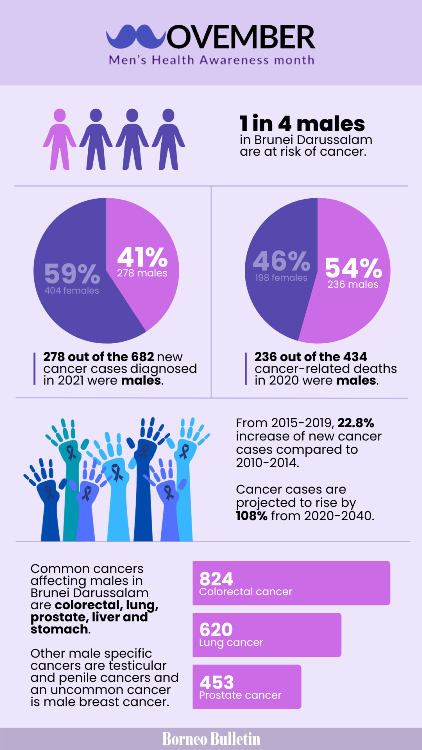
Movember highlights crucial men’s health issues and mental well-being
The world often expects men to embody strength, valuing their unyielding facade of resilience, which unfortunately leads many to endure their struggle in silence, confined to a suffocating norm that discourages vulnerability.
As we step into this year’s Movember, a global movement where men grow moustaches throughout the month to spotlight crucial men’s health issues, there is a notable focus on men’s mental well-being.
“Movember is not just about growing facial hair in support of cancer patients, but rather to increase awareness on the disease and remove the stigma surrounding men’s mental health on the issue,” said Chairman of Movember and Head of Medical Oncology and Palliative Care Unit of The Brunei Cancer Centre (TBCC) Dr Haji Zulkhairi bin Haji Mohamad.
Speaking during a forum to mark Men’s Health Awareness Month organised by the Pantai Jerudong Specialist Centre (PJSC) and held at TBCC recently, he highlighted a pivotal theme that echoed throughout their discussions, that men must accept and understand their vulnerabilities.
The forum featured TBCC Consultant Medical Oncologist Dr Ravi Sekhar Patnaik, Counsellor and Motivator Haji Ali Yusri bin Abdul Ghafor, Narcotics Control Bureau Senior Narcotics Officer Abdul Halim bin Haji Mohamed and cancer patient Eyad Samhan bin Nyawa.
“Men are conditioned to hide their emotions, which can lead to a higher incidence of mental health issues including depression and anxiety,” said Dr Haji Zulkhairi.
“Men face unique medical challenges, and this month-long campaign serves as a platform to address these issues head-on. It’s not just about physical health, mental health is a significant part of the campaign.”
During the forum, the panel highlighted that men tend to suffer in silence, keeping their health concerns to themselves while frequently engaging in risky behaviours.

A majority of men were also found to lack a general awareness on what they can do to improve their health and live happier lives.
Citing data from the Brunei Darussalam Cancer Registry (BDCR), Non-Communicable Diseases (NCD) Prevention Unit, Ministry of Health (MoH), 682 new cancer cases were diagnosed in 2021, of which 278 (41 per cent) were males.
With this data, it is estimated that one in four males in Brunei Darussalam will develop cancer in their lifetime.
The panel continued by citing recent records which indicate a concerning trend in the Sultanate, where there is 22.8 per cent increase in new cancer diagnoses from 2015-2019 compared to 2010-2014.
If this trajectory continues, cancer cases are expected to rise by a staggering 108 per cent from 2020 to 2040.
The panel highlighted that these alarming statistics can be attributed to various factors, including changes in lifestyles, smoking habits, the consumption of harmful substances like alcohol and caffeine, lack of physical activity, and the rise in morbid obesity.
Colorectal cancer topped the list with 824 cases in the past decade, followed by 620 cases of lung cancer and 453 cases of prostate cancer in Brunei Darussalam.
Other male specific cancers include testicular and penile cancer.
The panel highlighted the significance of screenings, preventive measures, and making healthier lifestyle choices, stressing the importance of staying motivated, setting health goals, as well as addressing the impact of substance abuse on men’s health.
EARLY DETECTION AND PROACTIVE MEASURES
Screening plays a crucial role in detecting cancer early, even before any noticeable signs or symptoms emerge. In Brunei Darussalam, the MoH has implemented three dedicated screening programmes for cervical cancer, breast cancer, and colon cancer.
Prostate cancer screening involves a straightforward blood test called PSA and a clinical examination of the prostate gland, known as a digital rectal examination, tailored to the patient’s risk category.
The panel underscored the importance of prostate cancer screening for men over 50, especially those with a family history of the disease or genetic mutations like BRCA.
If there’s suspicion of prostate cancer, confirmation is sought through tests like transrectal ultrasound (TRUS) or magnetic resonance imaging (MRI) guided prostatic biopsy.
Following diagnosis, advanced tests such as PSMA-PET scans are conducted as recommended by oncologists.

Prostate cancer management employs a three-pronged approach based on the disease’s stage, with early-stage cases often monitored closely or treated through active surveillance.
In contrast, testicular cancer primarily affects younger individuals, typically between 15 to 35 years of age. Patients often report painless swelling, changes in the size or texture of a testis, or occasional dull aching pain.
Testicular cancer risk factors include undescended testis, family history, and abnormal testis development, primarily germ cell cancers like seminomas or non-seminomatous germ cell tumours (NSGCT).
Treatment involves a combination of surgery, chemotherapy, and radiotherapy, tailored to the cancer’s stage and risk level.
Encouragingly, early-stage testicular cancers boast an impressive 99 per cent five-year survival rate, while advanced-stage cases demonstrate a commendable 75 per cent five-year survival rate.

To detect testicular cancer early, men at risk are encouraged to perform regular self-examinations and promptly seek medical attention if they notice any abnormalities.
Colorectal cancer and lung cancer also remain prevalent concerns, emphasising the importance of awareness and proactive healthcare measures. – Rizal Faisal







